Bugatti simply unveiled its newest seven-figure ultra-car, the Tourbillon. Although it defies the marque’s current custom of naming its autos after notable drivers from its historical past, the moniker is smart. Not simply because a tourbillon is an beautiful mechanical object crafted to specific tolerances, or as a result of it’s, just like the model, a French invention, however as a result of one can’t spell it with out the phrase Billion, and that web value is the value of entry for Bugatti house owners. (Bullion additionally works.)
The automotive’s stats are spectacular. Gone is the lunatic quad-turbocharged 8.0-liter W16 engine that powered the Tourbillon’s predecessors, the Chiron and Veyron (and all their variants) in outputs starting from 1000 to 1578 horsepower. It has been changed by an much more outrageous powertrain: a naturally-aspirated, 1000-hp 8.3-liter V-16, mixed with an 800-hp trio of electrical motors, two driving the entrance wheels and one serving to out the ICE amidship on the rears. Although Bugatti claims that, having crested the 300 mph barrier, chasing prime pace information is now gauche, acceleration and V-max ought to be virulent sufficient to supply short-term supplemental facelifts for its shoppers, conserving the rattles out of their wattles.
However now that scorching off-the-line efficiency is out there to anybody with sufficient lithium-ion cells — or a contract with Rimac Applied sciences, the electrical go-fast subsidiary of Rimac Automobili, the Croatian battery-powered supercar producer that Bugatti merged with a couple of years again — a Bugatti should present one thing extra. It should present an expertise, an event, enduring delight.
Our favourite options within the new automotive do exactly this. Learn on to search out out what we imply.
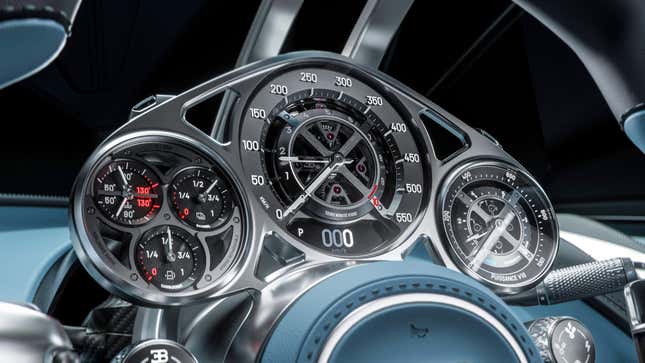
Instrument Panel: We’re undecided which got here first, the automotive’s title or the design of this instrument panel, however Bugatti has taken the entire Tourbillon expertise to the subsequent stage, with a set of gauges constructed with the identical precision and aesthetic because the motion in a high quality Swiss watch. Its titanium, sapphire, and ruby mechanisms carry out an analog ballet. So as a way to present house owners with the very best view of their needles’ sweep, Bugatti has designed a hard and fast hub steering wheel, the spokes of which hook up with the column behind the “skeletonized cluster.”
Thus, regardless of the place one is within the wheel’s rotation, the stunning gauges are all the time seen. We’re notably keen on the central tachometer-inside-the-speedometer setup, because it reminds us of a comparable format on the first-generation Honda Prelude.
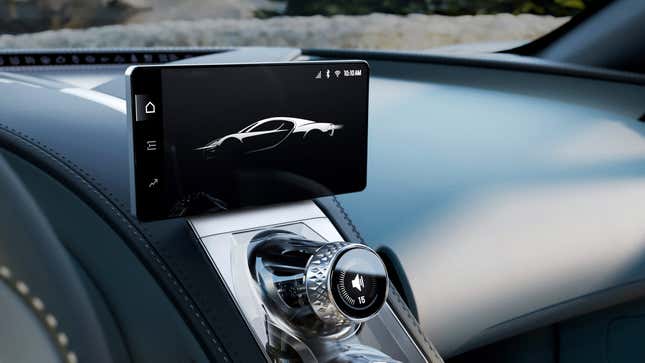
(Virtually) No Screens: Reward Carrus — the jackal-headed, Olympic gymnast-bodied god of vehicles! Bugatti is operating counter to the heinous automotive development of metastasizing LCD screens. This contrarian place extends past the aforementioned analog instrument cluster, to the whole cabin. Screens have been banished, in favor of a middle console fabricated from a single piece of billet aluminum, impregnated with glass crystal and knurled aluminum switchgear. Knobs and exhausting buttons right here and on the steering wheel management oft-used options like adjusting the HVAC, leisure quantity, traction management, and drive modes.
Luxurious automakers of the world, take observe! For these of you who can’t reside with a display, a tiny one, concerning the dimension of a telephone, is totally hidden inside the sprint. It rises out of there robotically in simply two seconds to function a compulsory backup digital camera, in portrait mode, when one shifts into reverse; and it may be referred to as up in 5 seconds, on the contact of a button, in full panorama mode for Apple CarPlay options.
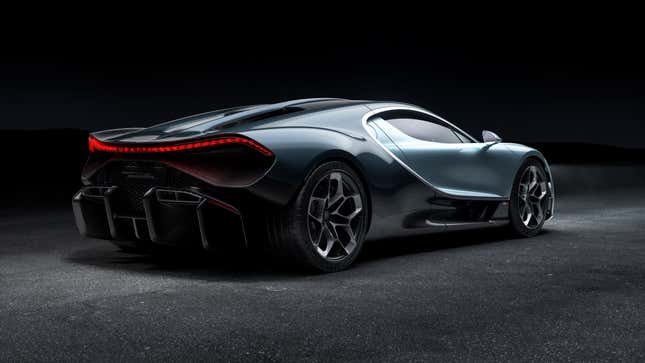
Weight: With ever-increasing buyer calls for for extra efficiency, consolation, and inside area, vehicles have a tendency to achieve weight technology over technology. When a fancy electrified powertrain is added, this acquire could be a step-change above earlier fashions. At over two tons, the outgoing Bugatti Chiron was no featherweight. However regardless of including three electrical motors and a 24.8-kWh battery, and upsizing the engine, cabin, and cargo capability, the Tourbillon weighs lower than the Chiron. This magic was completed by means of quite a lot of strategies: carbon composite development, utilizing the battery as a structural member, making frames out of thin-wall aluminum castings, and 3D-printing the structural braces together with suspension and airfoil parts. Bugatti even light-weighted the monster engine, which weighs “solely” 555 kilos in distinction to the almost 900-pound weight of the outgoing W16. We surprise if, mixed, these 32-cylinder pair weigh roughly than the 12.8-liter straight-8 that powered the model’s Sort 41 Royale within the Thirties.
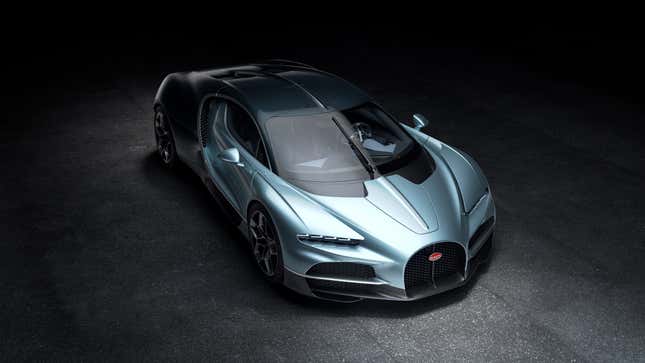
Frunk: The Veyron and Chiron weren’t recognized for his or her inside storage, so for lengthy journeys, house owners sometimes outsourced banal bodily acts like carrying baggage to sherpas or different servants, who doubtless adopted on foot, or in a fleet of Mercedes Sprinter vans. The Chiron’s frontal storage space was famously sized to suit a briefcase. A wider entrance observe, together with a cooling system that ducts air by means of and out of the hood, affords a frunk between the dual entrance radiators, massive sufficient for a set of bespoke Tourbillon baggage. We’d spec it to match our inside, after all.
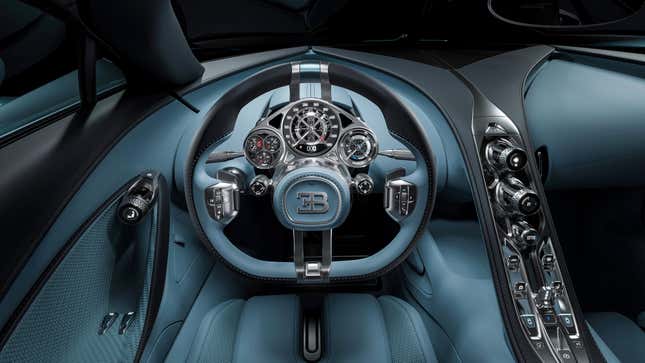
Startup: Beginning a classic Bugatti is a time consuming expertise. However it’s simply that, an expertise, a memorable occasion. The straightforward twisting of a key, or pushing of a button — even when it’s lined in a protecting flip-up flap, like a fighter jet — isn’t sufficient of an event for a car of this caliber. Bugatti has solved that by incorporating a brand new iteration of an outdated know-how: an ignition pull. Like on a Duesenberg SSJ, you pull it out to begin the motor. Not like a Duesenberg SSJ, it’s fabricated from crystal and aluminum. Additionally in contrast to a Duesenberg SSJ, you push it in to cease.


